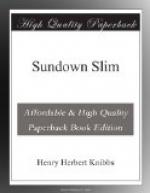Chance hesitated, leaping up and whining.
“That’s all right, pardner. They ain’t nothin’ goin’ to happen to me. You go!”
Chance trotted off a few yards and then turned his head inquiringly.
“That’s right. Keep a-goin’. It’s your stunt this time.” And Sundown waved his arm.
The return of Sundown without the dog occasioned no suspicion on the Mexican’s part. He most naturally thought, if he considered the fact at all, that the dog was hunting the mesas. Then Sundown entered the house and experimented with soda and cream-of-tartar as though he were concocting a high explosive with proportions of the ingredients calculated to produce the most satisfactory results. His plan, however, was nipped in the bud. That night the herders refused to eat the biscuits after tasting them.
Hi Wingle, coming from the bunk-house, wiped his hands on his apron, rolled a cigarette, and squatted in the shade. From within came the clatter of knives and forks and the rattle of dishes. The riders of the Concho were about through dinner. Wingle, gazing down the road, suddenly cast his cigarette away and rose. The road seemed empty save for a lean brown shape that raced toward the Concho with sweeping stride. “It’s the dog. Wonder what’s up now?”
Chance, his muzzle specked with froth and his tongue lolling, swung into the yard and trotted to Wingle. “Boss git piled ag’in?” queried the cook, patting Chance’s head. “What you scratchin’ about?”
The dog lay panting and occasionally pawing at his collar.
“What’s the matter? Cockle-burr?” And Wingle ran his fingers under the collar. “So? Playin’ mail-man, eh?”
He spread out the note and read it. Slowly he straightened up and slowly he walked to the bunk-house. “No. Guess I’ll tell Jack first.”
He strode to the office and laid the note on Corliss’s desk. The rancher, busy running up totals on the pay-roll, glanced at the sweat-stained piece of paper. He read it and pushed it from him. “All right, Hi.”
Wingle hesitated, then stepped out and over to the bunk-house. “Takes it mighty cool! Wonder what he’s got up his sleeve. Somethin’—sure!”
Corliss studied the note. Then he reached for paper and envelopes and wrote busily. One of the letters was to the sheriff in Antelope. It was brief.
I’m going to push a bunch of stock over to the water-hole range. My boys have instructions not to shoot. That’s the best I can do for them and the other side. JOHN CORLISS.
The other letter was to Nell Loring. Then he rose and buckled on his gun. At the bunk-house he gave the letters to Lone Johnny, who saddled and departed immediately.
Without making the contents of the note known, he told the men that they would join Bud Shoop and his outfit at the Knoll and push the herd north. Later he took Wingle aside and told him that he could stay and look after the rancho.




